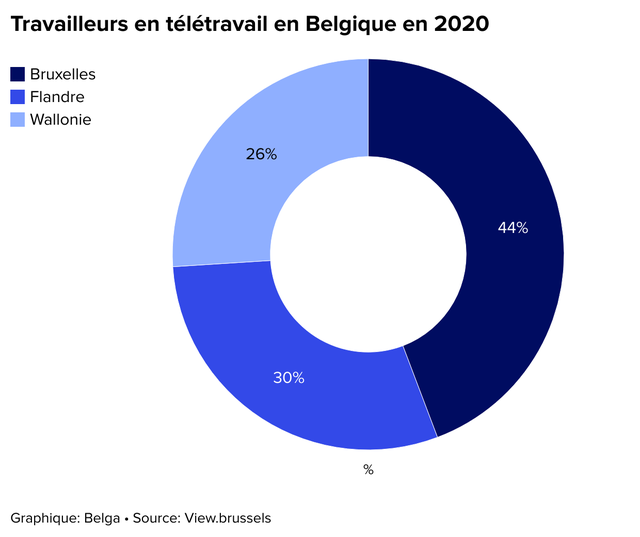More people work remotely in Brussels (42.7%) than in Flanders (28.7%) or Wallonia (25.1%), according to the initial employment quality barometer by view.brussels, in cooperation with social partners.
The barometer, initiated by the Brussels Minister of Employment, Bernard Clerfayt, investigates different types of jobs in the Brussels region.
View.brussels employed the WES model, a method tested and approved by other countries, to measure job quality using beyond twenty indicators, such as contract type, earnings, flexibility, emotional workload, training opportunities and bonuses.
The initial assessment provides insights based on 2020 data, showing an increase in the employment rate of Brussels job seekers from 21.1% in 2019 to 27.3%.
Employment rates, however, varied by factors such as gender, age and educational level. The highest employment rates were among those under 30.
Brussels has a higher monthly gross salary with full-time workers earning €4,596 in 2020, compared to €3,801 in Flanders and €3,587 in Wallonia.
Those on permanent full-time contracts typically earn more than those on fixed-term contracts, with a particularly high disparity in Brussels (+63.4%) than other regions (approx. +41%).

Credit: Belga / View.brussels
In the study, researchers found wage disparities based on gender and region. In Flanders and Wallonia, full-time female workers earn on average more than their male counterparts, which is opposite to Brussels.
Temporary salaried employment is relatively low in Brussels, representing 9.4% of total employment in 2020, matching Flanders and lower than Wallonia’s 12.8%.
Part-time contracts are less common in Brussels (18.9%) than in Wallonia (25%) and Flanders (26.8%). These contracts continue to be more common among women (28.9% in 2020).
More Brussels workers hold higher education degrees (60.5%) than those in Flanders (48.4%) or Wallonia (49%).
Lastly, Brussels workers participated more in continuous training (54.4%) compared to their Flemish (50.8%) and Walloon (44.6%) counterparts.

